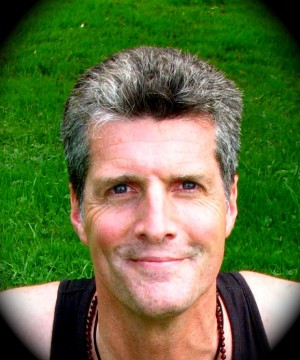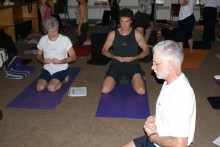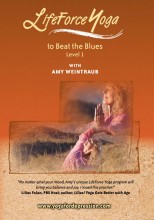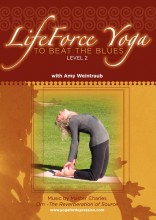
We would like to welcome Guest Blogger Tom McCarroll, MBA, MA, RYT. Tom is a certified Kripalu yoga instructor and Level One LifeForce Yoga practitioner. He finds much reward in sharing the gifts of yoga with people from all walks of life.
He couldn’t have been more than twenty-one, and he didn’t really even look that old—just a sweet faced kid, really. He’d been coming to the yoga class at the drug and alcohol rehab steadily for a few weeks. “I’m going home tomorrow,” he said after class.
“And you know,” he added, “I feel better after yoga then I ever did after shooting a bag of dope.” I don’t know if he continued yoga, or even if he stayed clean and sober, but I know he had a better chance as a result of a rehab that included a program of yoga as part of the treatment plan.
I teach yoga to individuals recovering from alcoholism and drug addiction in a number of settings, including a 28-day rehab, a halfway house, and an outpatient treatment facility. The results I’ve seen first hand have been powerful. Time and time again, I have seen people enter class troubled and wary, and leave emanating a deep and abiding sense of peace. Becoming comfortable in your own skin is not the most important aspect of recovery, but it is important.

More so, recovery is about staying away from that first drink, that first taste, just for today; at least that’s been my experience. I do it one day at a time, and I don’t do it alone. From a behavioral standpoint, a significant way to overcome relapse is to stay away from people, places and things that are triggers. This concept is consistent with the time-tested experience of those in 12-step programs who have learned the value of a fellowship of healthy, like-minded people traveling the same path focused on the day at hand.
Although recovery may be a one-day-at-a-time proposition, the days and years do add up if one is earnest and dedicated to one’s program of maintaining sobriety. It has been my observation that, with continued sobriety, deeper layers of discovery and personal exploration continually reveal themselves. Just how this exploration is undertaken is an essential component of daily stress management, which includes working with compulsive thoughts that can lead to relapse for the newcomer and experienced alike.
One of the most meaningful ways in which a program of recovery can grow and deepen is through the addition of a yoga practice. The alignment between the 12 steps of recovery and yoga is as natural as a flowing stream. Both, when followed conscientiously, connect people to a deepening spirituality, and an awareness of motives and consequences for the behavioral options that they choose to exercise. Both emphasize prayer and meditation as an avenue for living life more skillfully. What is miraculous is that the 12 steps can offer an interpretation of a concept like Patanjali’s “Yoga citta vritti nirodha,” which roughly translates to yoga is the cessation of the mental turnings of the mind, in such a way that it can be grasped by someone dazed, confused and at bottom. All of us, and not just people in recovery need to learn how to transform our thought forms– and begin to seek happiness from the source. Yoga teaches us that happiness comes from inside, not from external things– whether it be drugs, alcohol, another person, or anything external– so by giving addicts a new perspective based on yogic teachings, there is immense potential for transformation. The aim of recovery is to transform the individual from one who would drink or use drugs to one that no longer views that as an acceptable option.
Let’s face it, alcoholics and drug addicts are not alone in their tendency for poor impulse control; it’s just that the consequences of poor impulse control for this population are often dramatic and immediately disastrous. However, all of us, if we allow the ego free reign, will soon find ourselves living a life of reaction in which we ping-pong endlessly through our lives. While living well, with presence and gratitude, offers its own rewards, the opposite is also true: letting the ego steer the chariot will eventually result in pain and suffering. The 12 steps, like yoga, are about surrender of the self to a higher power as a means of ego deflation.
Additionally, the physical toll of addictive behaviors can be immense, and may also contribute to an addict’s shame. For this reason, learning reverence and respect for the body through the practice of yoga may help recovering addicts avoid relapses. When people think about yoga, they often visualize the physical postures or asanas that form the basis for most western yoga practices. While it is true that asana practice offers a gentle and peaceful way for recovering addicts to reconnect with their bodies, these postures are only a gateway to the vast healing resources of a fuller yogic experience that includes pranayama (yogic breathing techniques) and deep, guided relaxation.
For addicts who are often jumpy and unable to self-soothe, simple yogic breathing techniques can provide immense relief from racing or impulsive thoughts, as well as relieve tension, fear, anger, frustration, and anxiety. The ability to defuse thoughts and situations, which trigger addictive behaviors, represents a key to recovery. The calm and clarity that arise through practices like deep belly breathing may help an addict step back from the edge and make a choice to call someone who supports his recovery, instead of engage in self destructive behavior. In this way, the practice of yoga can have benefits that extend far beyond the mat. Those of us, both in and out of recovery who have a yoga practice know what a gift it can be. In yoga, as in the steps, we have a beautiful tool for transforming life and becoming truly free.
For yoga practice that offers the gift of self-acceptance and a dissolving of the shame, try the LifeForce Yoga DVDs. If you’re a beginner, try the level 1. If you have been practicing for a while, try level 2.
Originally published in Common Ground (September, 2011)

